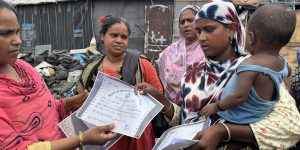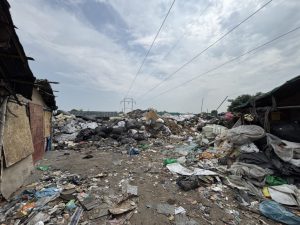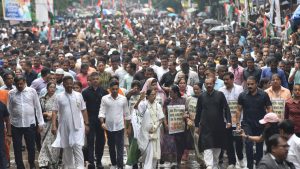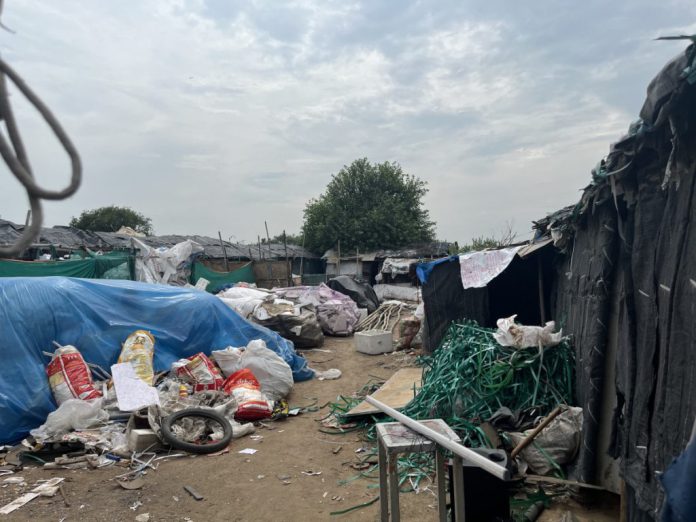Synopsis:
Bengali identity comes under question as police detentions in Gurugram spark fear among migrant workers, prompting mass return to West Bengal. Human rights groups raise alarm.
By Qalam Times News Network
Bengali identity has suddenly become a source of fear for thousands of migrant workers in Gurugram, Haryana. A targeted police crackdown, ostensibly aimed at illegal infiltrators, has disproportionately affected Bengali-speaking communities, triggering widespread panic and forcing hundreds to abandon their livelihoods and flee back to West Bengal.

This wave of fear has emptied major migrant localities like Sector 49’s “Bengali Market,” which once housed over 500 Bengali workers. Now, it stands eerily quiet as nearly all families have left, fearing arbitrary detention. The focus on Bengali identity—rather than individual legal status—has unsettled even those with proper documentation.
Crackdown on ‘Illegal Migrants’ Spurs Widespread Panic
Over the past week, Gurugram Police have ramped up a special operation to identify alleged illegal immigrants. According to official figures, more than 250 individuals—mostly Bengali-speaking—have been taken into custody. Many are being held in temporary detention centers at community halls in Sector 10A, Badshahpur, Sector 40, and Manesar, pending document verification.

Police officials insist they are acting within the guidelines laid down by the central government and that no one is being held without cause. However, testimonies from the ground suggest otherwise.
Several migrant workers from West Bengal and Assam report being detained solely for speaking Bengali. In Sohna village, 13 Bengali-speaking Muslims were detained, prompting the Jamiat Ulama-i-Hind to intervene, claiming all of them were Indian citizens carrying valid Aadhaar and voter ID cards.
Labour Crisis Deepens in Gurugram’s Informal Sector
The real-world fallout has been immediate. Gurugram’s informal economy—heavily reliant on Bengali-speaking labourers—has taken a hit. Sanitation, waste collection, construction, and domestic work are all facing acute manpower shortages.
Jahangir Islam, a garbage collector for the past decade, recounted being picked up by police five days ago without explanation. “I haven’t gone to work since. Everyone’s scared. We don’t know who’s next,” he said.
In several sectors, garbage has started piling up, and key construction projects are stalled. Contractors warn that delays will continue unless the issue is resolved quickly.
Bengali Voices: “We Are Citizens, Not Criminals”
Karimul Islam, a car cleaner in Palra for six years, has also packed up. “I have all my documents—Aadhaar, voter ID. But who’s listening? People are being picked up for no reason,” he told Times of India before boarding a flight back to Bengal.
54-year-old mason Jamaluddin from West Dinajpur said he asked his son to skip college for a few days out of fear. “Even students aren’t safe if they speak Bengali,” he said.
In another case, a woman named Khatun shared how her husband was picked up while cleaning cars in a residential society. She had to bring their documents to the detention center to secure his release.
Misidentification and Deportation: Not Just a Gurugram Issue
This pattern isn’t limited to Haryana. Similar stories have surfaced from Maharashtra, Gujarat, and Rajasthan. In a shocking June 2025 case, Mumbai police deported Fajer Mandal and his wife Taslima—residents of West Bengal’s North 24 Parganas—to Bangladesh, despite their valid Indian documents. They were brought back only after state government intervention.

In Bengaluru, Palash Adhikari and his family were jailed for three months after being mistaken for illegal migrants simply because they spoke Bengali.
Mamata Banerjee Slams ‘Linguistic Terror’; BJP Hits Back
West Bengal Chief Minister Mamata Banerjee has called this wave of detentions a form of “linguistic terror.” She accused the BJP-led governments of targeting Bengalis under the guise of national security. “Speaking Bengali is not a crime. This is a direct insult to the language and our state,” she said, warning that the Trinamool Congress will protest nationwide.

Reacting swiftly, BJP IT cell head Amit Malviya denied the charges, calling Banerjee a “liar.” He claimed the detainees were illegal Bangladeshi immigrants and accused her of equating them with legitimate Indian citizens for political gain.
“You’ve enabled these migrants to obtain documents in exchange for votes,” he wrote on X, adding, “No illegal migrant will be spared—don’t hide behind the Bengali language.”
Human Rights Groups Call for Due Process
Civil rights organizations are now raising alarms about the apparent conflation of Bengali identity with foreign infiltration. They argue that police actions must be transparent, legally grounded, and sensitive to cultural and linguistic diversity. Above all, the demand is simple: do not punish people for the language they speak.







